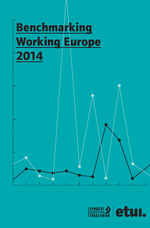McDonnell, D. (2014) “The rise of Euroscepticism across Europe has masked general apathy about the European elections among voters“, LSE EUROPP, 29 Απριλίου. Marine Le Pen’s Front National and Geert Wilders’ Party for Freedom have announced that they intend to form a ‘Eurosceptic alliance’ in the European Parliament after the 2014 European elections. Duncan McDonnell writes that while the overall picture in the European elections will see Eurosceptic parties …Read More
Europe’s Trapped Politics
Pisani-Ferry, J. (2014) “Europe’s Trapped Politics”, Project Syndicate, 29 Απριλίου. PARIS – When the last European Parliament election was held, in 2009, it seemed that Europe’s citizens were all facing the same dangers. Across the continent, governments were busy coping with the consequences of the global crisis that had erupted the year before. Five years later, on the eve of another European Parliament election, the situation could not be …Read More
Benchmarking Working Europe 2014
ETUI (2014) “Benchmarking Working Europe 2014“, European Trade Union Institute (ETUI) Report, 29 Απριλίου. The year 2010 saw the launch of the Europe 2020 strategy. The new EU strategy had been devised for the purpose of promoting smart, sustainable and inclusive growth that would help Europe recover from the crisis and re-emerge stronger and more prosperous on the other side. In June of the same year, the European Semester …Read More
The Single Market and Cohesion Policy Dyad: Battered by the Crisis and Globalisation
Jouen, Μ. (2014) “The Single Market and Cohesion Policy Dyad: Battered by the Crisis and Globalisation”, Notre Europe Policy Papers, 28 Απριλίου. This Policy Paper by Marjorie Jouen aims at understanding the current relationship between the policy to reduce regional and social disparities and the one aimed at ensuring the opening of European markets. Part 1 recalls the nature of the strong bond between these policies for over twenty …Read More
Missing a generation in EU politics
European Policy Centre (2014) “Missing a generation in EU politics”, FutureLab Europe, 07 Απριλίου. The European Union has always struggled to build a strong relation with its electorate and the results of the 2009 European elections showed that turnout is still declining but also significantly lower than in national elections. The percentage of young people that voted in these elections was even lower, with an average of 29% for …Read More
What are the effects of the EU budget: Driving force or drop in the ocean?
Núñez-Ferrer, J. & Katarivas, M. (2014) “What are the effects of the EU budget: Driving force or drop in the ocean?”, CEPS Special Reports, Economic Policy, 28 Aπριλίου. The study presents an overview of the impact of the main investment tools of the EU budget. The focus is on the increasing role of the financial instruments, which are fundamentally changing the budget’s nature and reach. Through these instruments, the …Read More
The IMF’s preferred creditor status: Questions after the Eurozone crisis
Schadler, S. (2014) “The IMF’s preferred creditor status: Questions after the Eurozone crisis”, VoxEU Organisation, 28 Απριλίου. The IMF has had a preferred creditor status throughout the history of its lending. This implies that borrowing countries are expected to give priority to meeting their obligations to the IMF over other creditors. This column reviews the onset of this preferred status, its purpose, and the way it changed after the …Read More
Shrinking times – ECB excess liquidity falls below €100 billion
Merler, S. (2014) “Shrinking times – ECB excess liquidity falls below €100 billion”, Bruegel Think Tank, 24 Απριλίου Over the last 5 years, the Eurozone financial system has been flooded with liquidity, due to the ECB’s very special response to the very special bank-sovereign euro crisis. In 2008, faced with an almost frozen interbank market, the ECB changed the way it allocates the Central Bank’s funds, introducing a policy …Read More
Bureaucracy may be the solution, rather than the problem, for issues of European governance
Lodge, M. & Wegrich, K. (2014) “Bureaucracy may be the solution, rather than the problem, for issues of European governance“, LSE EUROPP, 24 Απριλίου. The European Union is often criticised from the perspective that it has created a layer of bureaucracy or ‘red tape’ which has a damaging effect on European governance. Martin Lodge and Kai Wegrich write that while it is particularly common for political parties to make …Read More
European Banking Union: Status of Implementation and the Need for Improvement
Bauer, M. & Demary, M. (2014) “European Banking Union: Status of Implementation and the Need for Improvement“, Konrand Adenauer Stiftung, 23 Απριλίου. The crisis in the euro area revealed points of weakness in the architecture of the Monetary Union. It appeared that the common monetary policy also required a common system of banking supervision. This report summarises the current proposals and decisions regarding the Banking Union and evaluates the …Read More





